- Recent Articles
-
Product Guides
-
Garments
- HOW TO CHOOSE THE BEST WATERPROOF WORKWEAR
- GEAR UP, FLEX ON: MEET THE FROSTFLEX™ SYSTEM FROM REFRIGIWEAR
- TOP 5 THINGS TO LOOK FOR IN THE WARMEST JACKETS
- WHY DO YOU NEED COLD WEATHER BIB OVERALLS?
- 5 ALL WEATHER JACKETS YOU CAN WEAR IN ANY SEASON
- 5 WORK SWEATSHIRTS AND HOODIES THAT ARE PERFECT FOR FALL TEMPERATURES
- 7 OF THE BEST WORK JACKETS FOR MEN
- 8 BEST HIGH-VISIBILITY JACKETS FOR CONSTRUCTION WORKERS
- COVERALLS vs. BIBS: WHICH ONE IS RIGHT FOR YOU?
- HOW AND WHY TO CHOOSE A PUFFER JACKET
- HOW TO CHOOSE THE BEST INSULATED BIB OVERALLS
- HOW TO CHOOSE THE RIGHT FLEECE JACKET
- BEST INSULATED GEAR FOR WOMEN
- OUTWORK ANY WEATHER WITH PREMIUM JACKETS
- THE BEST PANTS FOR COLD WEATHER
- TOP 7 FEATURES OF A SUBZERO SWEATSHIRT
- WHAT ARE THE BEST SWEATSHIRTS TO WEAR FOR COLD WEATHER?
- WHAT IS THE DIFFERENCE BETWEEN A DOWN JACKET AND A PUFFER JACKET?
- WHY AND WHEN TO WEAR A VEST FOR WARMTH
- TOP 4 OPTIONS FOR SPRING AND FALL GEAR
- 3 THINGS YOU NEED TO KNOW ABOUT HIVIS WORKWEAR
- TOP 5 MUST-HAVE FEATURES FOR RAINWEAR
- WHY DO YOU NEED A FREEZER SUIT IN THE GROCERY BUSINESS?
- WHY YOU SHOULD LOOK FOR BREATHABILITY AND WICKABILITY IN COLD WEATHER WORKWEAR
- CUSTOMER STORIES: BEST INSULATED BIB OVERALLS FOR WOMEN
-
Footwear
- WINTER WORK BOOT BUYER'S GUIDE
- SLIP-RESISTANT,SAFETY TOE, AND READY TO GO - THE SAFETY BOOT SURVIVAL GUIDE FOR HARD WORKING FEET
- 6 MOST DURABLE COLD WEATHER WORK BOOTS FOR MEN
- CASE STUDY: KEEPING CREWS ON THEIR FEET WITH PROPER FOOTWEAR
- HOW TO CHOOSE THE RIGHT SIZE WORKBOOT
- HOW TO EXTEND THE LIFE OF YOUR WORK BOOTS
- HOW TO FIND THE PERFECT WORK BOOTS FOR LANDSCAPING
- THE SCIENCE BEHIND MOISTURE-WICKING SOCKS
- YOUR FEET WILL THANK YOU FOR WEARING THESE WORK BOOTS
- 5 TIPS FOR CHOOSING THE BEST WORK BOOT
- Headwear
-
Gloves
- HOW TO CHOOSE WATERPROOF WORK GLOVES
- ULTIMATE GUIDE TO IMPACT PROTECTION GLOVES
- HOW TOUCHSCREEN GLOVES IMPROVE SAFETY
- TOP 5 WATERPROOF WORK GLOVES
- 5 UTILITY GLOVES THAT KEEP YOU WARM IN EXTREME COLD
- GIVE COLD THE FINGER: TOP 5 FEATURES OF PREMIUM GLOVES
- HOW TO USE GLOVE LINERS
- TOP 3 ADVANTAGES OF PERFORMANCE GLOVES
- 3 WAYS TOUCHSCREEN GLOVES MAKE YOUR JOB EASIER
- TOP 4 THINGS TO LOOK FOR IN WATERPROOF GLOVES
- HOW TO WEAR GLOVE LINERS ON THE JOB
- 9 WORK GLOVES BUILT FOR SERIOUS PROTECTION AND PERFORMANCE
- 9 MUST-HAVE FEATURES FOR WAREHOUSE WORK GLOVES
- Use & Care
-
Garments
-
RefrigiWear Knowledge
- REFRIGIWEAR EXPERT PUBLISHED IN ASSP PROFESSIONAL SAFETY
- SLIP-RESISTANT, SAFETY TOE, AND READY TO GO - THE SAFETY BOOT SURVIVAL GUIDE FOR HARD WORKING FEET
- HOW TO SHOVEL SNOW SAFELY
- 10 ESSENTIAL PIECES OF COLD WEATHER GEAR FOR FARMERS
- 10 TIPS FOR WORKING SAFELY IN COLD WEATHER
- 3 REASONS WHY FREEZER SUITS ARE ESSENTIAL FOR WORKING IN THE COLD
- A BEGINNER’S GUIDE TO WORKING OUTSIDE
- ADVANTAGES OF SYNTHETIC INSULATION
- COLD WEATHER GEAR FOR OUTDOOR ACTIVITIES
- HOW TO AVOID DRAFTS IN COLD WEATHER WORK CLOTHES
- HOW TO STAY WARM FROM HEAD TO TOE IN COLD WEATHER
- HOW TO STAY WARM ON THE JOB SITE
- HOW TO STORE WINTER WORKWEAR FOR THE SUMMER
- HOW TO USE REFRIGIWEAR COMFORT RATINGS TO CHOOSE INSULATED GEAR
- THE HEALTH RISKS OF WEARING TOO MUCH COLD WEATHER GEAR
- THE IMPORTANCE OF PROPER FOOT CARE WHEN WORKING IN THE COLD
- THE ULTIMATE SAFETY CHECKLIST FOR CONSTRUCTION WORKERS IN COLD CONDITIONS
- WHAT SHOULD I WEAR FOR SNOWMOBILING?
- WHAT’S THE TOUGHEST GEAR FOR COLD WEATHER?
- WHICH TYPE OF SLEEVE IS RIGHT FOR YOUR WINTER ACTIVITY?
- TOP 5 COLDEST AMERICAN CITIES AND HOW TO STAY WARM
- TOP 4 TIPS FOR WORKING IN THE RAIN
- 5 TIPS FOR MOTORCYCLING IN WINTER
- HOW TO DRESS FOR THE COLD IN 4 EASY STEPS
- A BEGINNER’S GUIDE TO STAYING WARM WHILE WORKING IN THE COLD
- HOW TO STAY WARM WHEN WORKING IN THE COLD
- COLD-WEATHER ROOFER SAFETY
- Stories
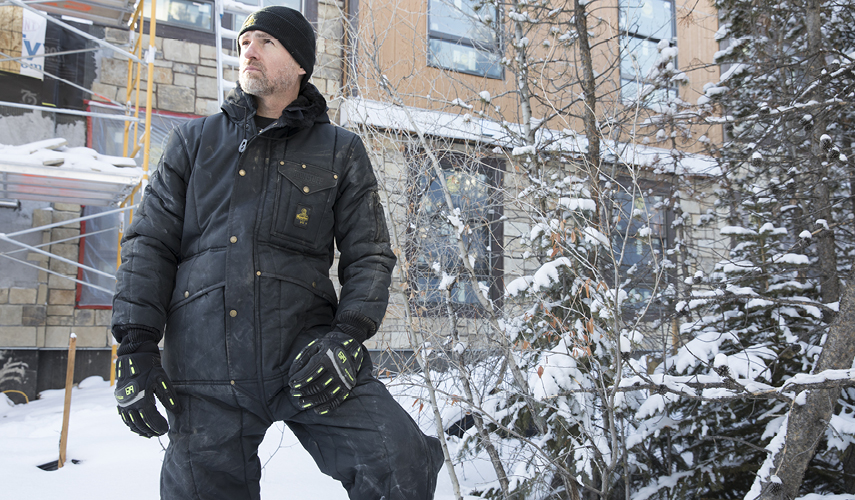
3 REASONS WHY FREEZER SUITS ARE ESSENTIAL FOR WORKING IN THE COLD
When it’s freezing cold on your job site, your gear better be packin’ heat. And nothing packs as much heat as an insulated freezer suit.
But, if you’ve never worked in the cold chain, such as a walk-in freezer at a grocery store or a cold storage warehouse, then you’ve probably haven’t seen all the insulated freezerwear needed to survive working in extreme cold temperatures.
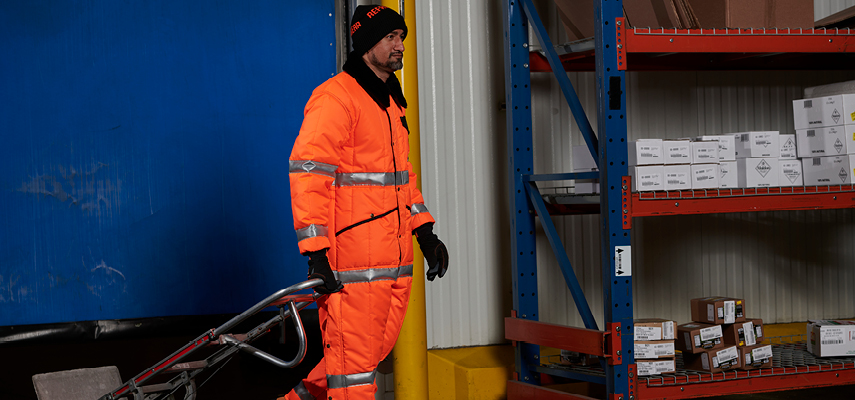
What Is a Freezer Suit?
A freezer suit is a specialized type of insulated coveralls or bib-and-jacket combination that includes industrial-grade insulation and a durable, weather-proof outershell to protect the body from head to toe. Freezer suits are made with varying levels of heavy-duty insulation, depending on the temperature and environment where they’ll be used.
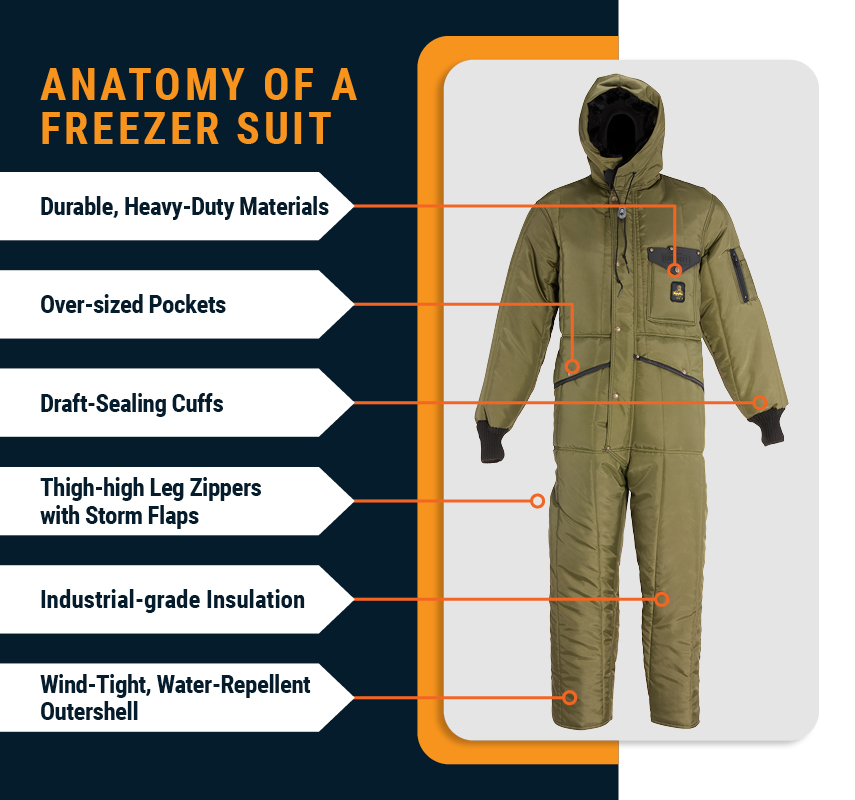
For example, blast freezing rooms generally operate at -40°C (-40°F) while other frozen food storage warehouses may operate between -34°C (-30°F) and -18°C (0°F). Insulated warehouse freezer gear such freezer suits and freezer gloves make it possible to work in these conditions safely, comfortably and for longer periods of time. RefrigiWear® was founded in 1954 to protect dairy workers in brutally cold conditions. Nearly 70 years later, we’re still protecting workers in the food supply chain with specialized freezerwear for food processing and distribution.
Beyond protecting workers who keep food flowing from farms to our families’ tables, insulated freezer suits are also vitally important in protecting medical workers who deliver medicines from manufacturers to medical facilities in remote locations around the world.
Certain medications like the ebola vaccine, the chickenpox vaccine and some COVID-19 vaccines, require frozen storage at temperatures colder than winter in Antarctica. Temperatures for storing these medicines in specialized cold rooms are kept continuously as cold as -80°C (-112°F). A heavily insulated freezer suit is absolutely essential for working even short periods of time in those conditions.
Do Freezer Suits Work Outdoors?
Yes. While freezer suits were originally designed for indoor cold storage environments, the protection that insulated freezer suits offer against the cold works just as well in the harsh winter weather of outdoor environments.
Read on to discover three ways that freezer suits deliver essential cold weather protection for people working outdoors in winter.
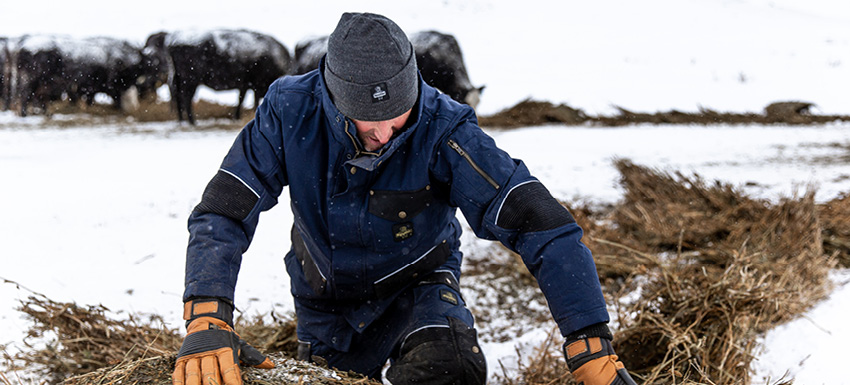
1. Insulated Freezer Suits Provide Full-Body Protection Against Cold-Related Illness
True, you can’t catch a cold from working outside. But spending hours on a frozen job site without a freezer suit and proper protection from the cold can make you really sick.
Hypothermia and frostbite are the most common cold-related illnesses, but many people who work outside don’t know that these serious illnesses can occur at above-freezing temperatures (40°F) and with winds as low as 5 miles per hour.
Hypothermia is an abnormally low body temperature cause by prolonged exposure to cold environments and occurs when body temperature drops below 95°F. A low body temperature affects the brain, so a person may not be able to recognize that hypothermia is setting in. Signs of hypothermia in adults include extreme shivering, exhaustion, confusion, slurred speech, fumbling hands, and memory loss. A person with sever hypothermia may lose consciousness and may not seem to have a pulse or be breathing.
Frostbite is an injury caused by freezing that results in a loss of feeling and color in the affected area, usually extremities like the nose, ears, fingers and toes. Signs of frostbite are a white or grayish color on the skin, skin that feels oddly firm or waxy and numbness. Severe cases of frostbite can require amputation of the affected body part.
An insulated freezer suit, or a cold storage jacket paired with insulated bib overalls, locks in your own body heat and completely blocks the wind from chilling your skin from neck to ankles. Add moisture-wicking base layers to pull sweat away from your skin, a hood or a face mask to protect your ears and nose, freezer working gloves to insulate your fingers while handling freezing tools and materials, and non-slip freezer working boots to keep you securely on your feet and you’ve got full-body protection from hypothermia and frostbite in extreme cold weather.
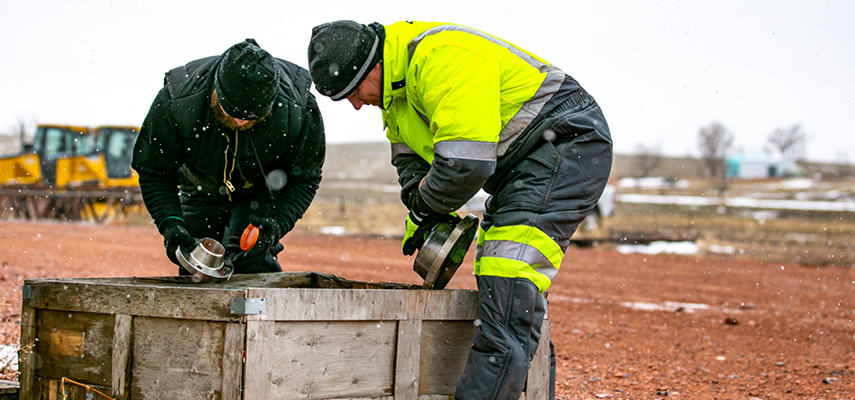
2. Insulated Freezer Suits Reduce Cold Stress and Increase Productivity
In the summer, construction workers and others who work outdoors are acutely aware of the dangers of heat stress. When the temperatures finally cool off, these workers now have to worry about the opposite: cold stress brought on by cold air temperature, wind chill, and rain or snow.
When the temps drop, so does productivity. First, your body works overtime to fight the cold and keep your critical organs warm. With all that energy being used, you tire easily and feel sluggish. And all that energy going toward heating means less energy for important things like concentration and critical thinking. Another reason for the dip in productivity is that working the cold is just plain uncomfortable. When you are focusing on being uncomfortable, you are distracted from the job at hand, which means your performance just isn't as high.
Insulated freezer suits or bib-and-jacket combinations reduce cold stress by minimizing breaks between garments so the cold, wind and rain can’t reach the skin or leech away the body heat being held inside the freezer suit’s insulation.
But bulky or too-warm garments can cause overheating, hinder your movement and make it more difficult to manage intricate work. The warmest freezer suits will have lightweight insulation rated as closely as possible to your work environment and activity level. Your freezer suit should also be constructed with thermal materials that are as thin as possible to keep you moving freely without sacrificing warmth or durability.
Choose the right freezer suit for your temperature range and activity level that allows you the most freedom of movement and you’ll master cold stress so you can keep being productive on outdoor jobs throughout the winter months.
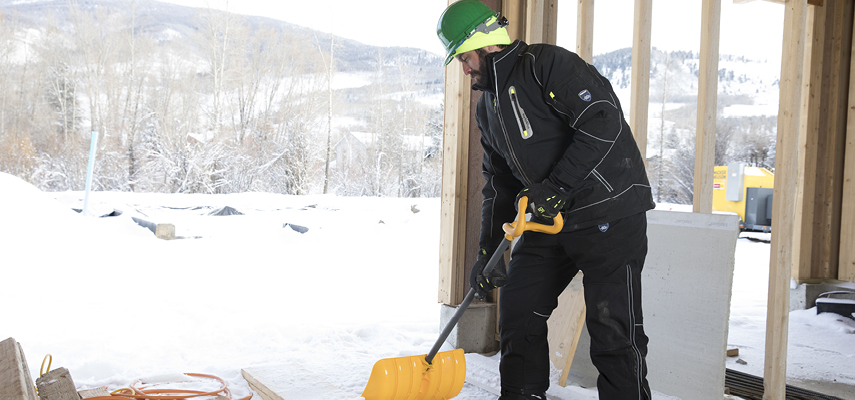
3. Insulated Freezer Suits Reduce Accidents and Increase Job Satisfaction
When you’re cold, you can become sluggish and clumsy, increasing your risk for an on-the-job accident for yourself or a coworker. Gearing up with the warmest freezer suit only takes a few minutes and it can be a literal lifesaver when you’re working up high, with heavy equipment or on high-traffic job sites.
A warm freezer suit helps maintain your circulation when you’re working outside in freezing temperatures. When you’ve got adequate warmth around your core and extremities, you can maintain blood flow to your hands and feet that helps you handle tools better so you don’t cut or club yourself (or anyone working nearby!) and helps you keep a sure-footed stance while working on slippery elevated surfaces so you don’t slip or fall.
Working outside in the winter is anything but a walk in the park. Having the best freezer suit won’t magically make a snowy slog across a frozen jobsite turn into a sunny stroll on a sandy beach, but feeling warmer goes a long way toward making a day on the job less miserable and more comfortable.
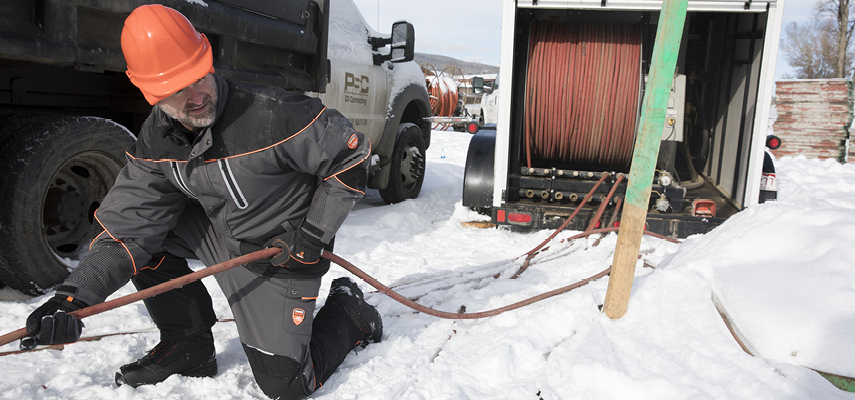
How to Choose the Warmest Freezer Suit
Choosing the best freezer suit for your work depends on what winter’s like where you are. If you’re working in the northern part of the U.S. or in Canada, you might need a heavily insulated freezer suit. In the southern part of the U.S. where temperatures might be near freezing but not below 0°F, you’ll probably want lighter weight freezerwear for milder conditions.
Here are four important things to consider when you’re comparing freezer suits or bib-and-jacket combinations:
Insulation for Your Activity Level
Choose a freezer suit rated for the temperature you’re working in, but remember to account for your activity level. If you’re active, you’ll make more of your own heat and need less insulation. If you’re sitting still, you might need more insulation with a freezer suit made for colder conditions.
Weather Resistance
Winter weather can be unpredictable, so look for wind-tight and water-repellent freezer suits. If you’ll be working in snowstorms or rain, you’ll want a freezer suit that is completely waterproof.
Durability
Head-to-toe protection does you no good if it doesn’t last. Look for freezer suits made from tear- and abrasion-resistant materials, such as nylon. You’ll also want reinforcement from heavy-duty patches that reduce wear-and-tear at knees, elbows and hems.
Accessories
Complete your head-to-toe insulated freezer suit coverage with cold weather accessories like knit caps, face masks, freezer gloves and insulated winter work boots.
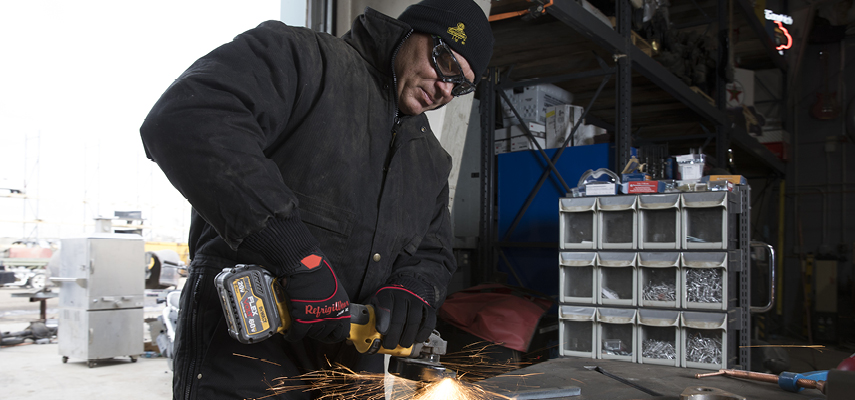
Shop Freezer Suits and Accessories
RefrigiWear® understands how tough it is to work day after day in the freezing cold. If you need help choosing the best freezer suit for your working conditions, or if you need help selecting the right size freezerwear, please contact RefrigiWear® customer service at 800-645-3744.